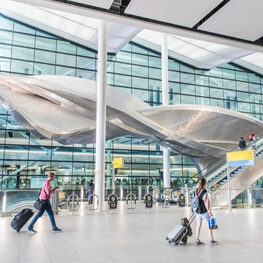Global tourism and travel stakeholders and investors expressed their disappointment this week over the announcement of the UK’s “green list” of countries that won’t require travelers to quarantine on return which excluded popular holiday destinations such as Greece and Spain.
Representing the sector worldwide, Gloria Guevara, World Travel & Tourism Council (WTTC) President and CEO said the UK “can ill-afford to be this cautious” particularly after suffering the biggest fall in contribution towards GDP from travel and tourism of the 10 most important global markets by 62.5 percent and a total of 148 billion pounds lost to its economy.
“Airlines and the wider travel and tourism sector will be hugely disappointed that the US, which has a similar vaccination success rate has not been included on the ‘green list’ as it would have enabled the resumption of transatlantic travel, which would have thrown a vital lifeline to the sector in two of the biggest travel and tourism markets in the world,” she said.
Current Green List a ‘Missed Opportunity’
On behalf of UK-registered carriers, Airlines UK CEO Tim Alderslade echoed Guevara’s sentiments describing the decision as a “missed opportunity”.
“We must see major additions to the green list at the next review point in three weeks, alongside a simpler and much reduced testing burden so that travel does not become the preserve of the wealthy only,” he said, adding that the UK is at risk of “falling behind” if it does not open up to key markets across Europe and the US.
Britain’s travel association ABTA also expressed its discontent with the decision.
ABTA CEO Mark Tanzer said the decision veered away from the approach initially outlined by the government and will “delay the industry’s recovery”, also calling on the UK government to review opening up travel to more destinations.
“We also need the government to commit to supporting travel agents and tour operators through what will continue to be difficult times ahead,” he added.
Meanwhile, easyJet, one of Britain’s leading budget carriers, in an angered response said the decision to open to so few countries on May 17 was “simply not justified by the data” and is “inconsistent” with announced plans.
“This decision means that so many people will continue to be unable to see their families and loved ones, develop their businesses or go on a much-needed holiday abroad,” easyJet said in a statement.
The company added that it expects the government to add more countries to the green list over the next month and to plan consistently “so that consumers and airlines alike can plan for this summer”.
It also called for cheaper tests and the removal of the testing requirement for green, low risk countries.
Greece Rival Portugal Gains Ground
Meanwhile, bookings in rival market Portugal soared after the news. Ryanair announced that it had boosted flights to Portuguese destinations opening over 175,000 extra seats as of May 17. According to UK tour operator Jet2holidays and its leisure airline Jet2.com, summer bookings to Faro and Madeira rose by more than 600 percent in the 24 hours following the green list announcement, and by over 1,300 percent when compared to the same period a week ago.
The UK is the fourth biggest G20 economy in terms of international travel and tourism spend from business travel, which amounted to 7.5 billion pounds in 2019, according to the WTTC.
It should be reminded that the UK has also been traditionally one Greece’s key source markets with 3.5 million arrivals generating 2.5 billion euros in 2019, according to central bank data. Last year, the number of UK travelers to Greece dropped by approximately 71 percent or 2.8 million passengers.
